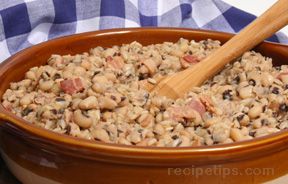Throughout the coastal South, eating Hoppin' John on New Year's Day is thought to bring a prosperous year filled with luck. The peas are symbolic of pennies or coins, and a coin is sometimes added to the pot or left under the dinner bowls. Collard greens, mustard greens, turnip greens, chard, kale, cabbage etc. along with this dish are supposed to also add to the wealth since they are the color of money. Another traditional food, cornbread, can also be served to represent wealth -- being the color of gold. On the day after New Year's Day, leftover "Hoppin' John" is called "Skippin' Jenny," and further demonstrates one's frugality, bringing a hope for an even better chance of prosperity in the New Year.
During the late Middle Ages, there was a tradition of eating beans on New Year's Day for good luck in parts of France and Spain. The European tradition mixed with an African food item to become a New World tradition.
One tradition common in the Southern USA is that each person at the meal should leave three peas on their plate to assure that the New Year will be filled with Luck, Fortune and Romance. Another tradition holds that counting the number of peas in a serving predicts the amount of luck (or wealth) that the diner will have in the coming year.
Other beans and rice dishes are seen throughout the American South and the Caribbean, and are often associated with Africans in the Americas. Regional variants include "Hoppin' Juan," which substitutes Cuban black beans for black-eyed peas, and the Brazilian dish Feijoada (pronounced: fejʒuˈadɐ), which uses black turtle beans instead of black-eyed peas.
The origins of the name are uncertain; one possibility is that the name is a corruption of the Haitian Creole term for black-eyed peas: pois pigeons (pronounced: [pwapiˈʒɔ̃]).
The Oxford English Dictionary's first reference to the dish is from Frederick Law Olmsted's 19th century travelogue, A Journey in the Seaboard Slave States. "The greatest luxury with which they are acquainted is a stew of bacon and peas, with red pepper, which they call 'Hopping John'." There is also a recipe for Hopping John in The Carolina Housewife by Sarah Rutledge, which was published in 1847.
During the late Middle Ages, there was a tradition of eating beans on New Year's Day for good luck in parts of France and Spain. The European tradition mixed with an African food item to become a New World tradition.
One tradition common in the Southern USA is that each person at the meal should leave three peas on their plate to assure that the New Year will be filled with Luck, Fortune and Romance. Another tradition holds that counting the number of peas in a serving predicts the amount of luck (or wealth) that the diner will have in the coming year.
Other beans and rice dishes are seen throughout the American South and the Caribbean, and are often associated with Africans in the Americas. Regional variants include "Hoppin' Juan," which substitutes Cuban black beans for black-eyed peas, and the Brazilian dish Feijoada (pronounced: fejʒuˈadɐ), which uses black turtle beans instead of black-eyed peas.
 Hoppin John with Fresh Pork |  Hoppin John \x3d Black Eye Peas |  Hoppin\x26#39; John |  Hoppin John. Rate: |  Quick Hoppin\x26#39; John. serves 2-4 |
 Slow Cooker Hoppin\x26#39; John |  Hoppin John Recipe |  Hoppin\x26#39; John Recipe enlarge |  hoppin-john |  Hoppin\x26#39; John Supper Photo |
 Hoppin\x26#39; John Recipe |  Hoppin\x26#39; John |  Hoppin\x26#39; John on New Year\x26#39;s Day |  Hoppin\x26#39; John Recipe |  Keller + Keller Hoppin\x26#39; John |
 Here is Hoppin\x26#39; John recipe, |  Hoppin\x26#39; John Salad - Boar\x26#39;s |  Hoppin\x26#39; John Recipe enlarge |  Hoppin John with Grits Polenta |  Shannen Doherty – Shannen |
No comments:
Post a Comment